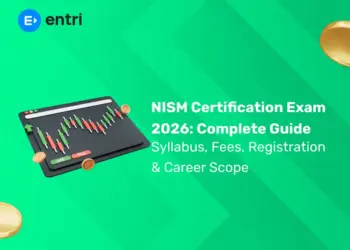Table of Contents
Introduction
Are you new to the stock market and feeling overwhelmed by financial jargon like ASBA, Demat, or CDSL?
Don’t worry, you’re not alone. This stock market glossary breaks down 50+ essential terms in simple, beginner-friendly language, tailored for India’s financial landscape. Whether you’re investing in IPOs, trading equities, or opening a Demat account, these terms will empower you to make smarter financial decisions.
Each term below is hyperlinked to a detailed blog post that explains its full form, meaning, real-world use cases, and FAQs.
👉 Bookmark this stock market glossary, your one-stop guide to understanding the Indian stock market!
Learn Stock Marketing with a Share Trading Expert! Explore Here!
📘 A-Z of Stock Market Terms
1: What is a stock?
💡 Tip: Click on any term to read the full explanation.
A
-
AMC – Annual Maintenance Charges: Yearly fee charged by your broker for maintaining a Demat account.
-
ASBA – Applications Supported by Blocked Amount: A system to apply for IPOs without transferring funds upfront.
B
-
BSDA – Basic Services Demat Account: A low-cost Demat account option for small investors.
C
-
CAS – Consolidated Account Statement: A summary of holdings across mutual funds and Demat accounts.
-
CDSL – Central Depository Services (India) Limited: One of India’s two stock depositories.
D
-
Demat – Dematerialised Account: An electronic account that holds your shares/securities.
-
DP – Depository Participant: The agent through which you access CDSL/NSDL services.
G
- GMP – Grey Market Premium: Investors are willing to pay for IPO shares in the unofficial grey market before they officially list on the stock exchange.
I
-
IA – Investment Adviser: A SEBI-registered professional who offers investment guidance.
-
IGRC – Investor Grievance Redressal Committee: SEBI committee for handling investor complaints.
-
IGRP – Investor Grievance Resolution Panel: NSE/BSE forum for investor dispute resolution.
-
IPO – Initial Public Offer: The process by which a private company becomes publicly listed.
K
-
KIN – KYC Identification Number: Unique code used to verify identity in financial transactions.
-
KYC – Know Your Client: Mandatory process to verify investor identity.
M
-
MII – Market Infrastructure Institutions: Core institutions like stock exchanges, depositories, and clearing houses.
-
MSE – Metropolitan Stock Exchange of India: One of the recognised stock exchanges in India.
N
-
NSDL – National Securities Depository Limited: India’s first depository, along with CDSL.
-
NSE – National Stock Exchange of India Limited: One of the largest stock exchanges in India.
P
-
PAN – Permanent Account Number: Unique ID issued by the Income Tax Department.
-
PoA – Power of Attorney: Legal document allowing brokers to transact on your behalf.
S
-
SCORES – SEBI Complaints Redress System: SEBI’s platform for resolving investor complaints.
-
SEBI – Securities and Exchange Board of India: Regulatory body overseeing India’s capital markets.
-
SMS – Short Message Service: Alerts sent by brokers, banks, and depositories.
U
-
UCC – Unique Client Code: An ID provided by brokers for each client’s trading account.
-
UID – Unique Identification: Often refers to Aadhaar in the context of financial compliance.
🧭 Ready to Learn More?
This glossary is just the beginning. Click on each term to dive deeper and level up your market knowledge. Whether you’re a beginner investor, trading enthusiast, or finance student, understanding these concepts will give you the edge you need.
Ready to apply these terms? Check out our Beginner’s Guide to Stock Trading in India for step-by-step advice. Open a Demat account to start trading or try a demo platform to practice. Explore entri’s free stock market course for more insights. Stay informed, invest smart, and grow your wealth!
📌 Don’t forget to bookmark this page, it’s your personal stock market dictionary!
Learn Stock Marketing with a Share Trading Expert! Explore Here!
Stock Market Trading Basics
Part-1: The History of Stock Trading
Part-2: The History of Stock Market Crashes
Part-3: Stock Market Trading: Vocabulary
Part 4: Equity Finance vs Debt Finance
Part-5: Indian Stock Market Holidays Calendar
Part-6: How to Invest Smartly in Stock Market
Disclaimer The information provided in this article is for general informational purposes only and is not intended as investment advice, financial guidance, or an offer or solicitation to buy or sell any securities. Stock data and financial figures are sourced from publicly available information and are believed to be accurate at the time of publication; however, we do not guarantee their accuracy or completeness. Past performance is not indicative of future results. Readers should conduct their own research or consult a qualified financial advisor before making any investment decisions. The author(s) and the publisher disclaim any liability for any loss or damage arising directly or indirectly from the use of or reliance on the information provided herein.
Stock Market Training Reviewed & Monitored by SEBI Registered RA
Trusted, concepts to help you grow with confidence. Enroll now and learn to start investing the right way.
Know moreFrequently Asked Questions
What is a stock market glossary?
A stock market glossary is a list of commonly used financial and trading terms with easy-to-understand definitions to help beginners understand market-related jargon.
Why should beginners learn stock market terms?
Understanding basic terms like Demat, IPO, or KYC empowers new investors to make informed decisions, avoid costly mistakes, and confidently interact with trading platforms.
Is a Demat account different from a trading account?
Yes. A Demat account holds your shares electronically, while a trading account is used to buy or sell those shares on the stock exchange.
How can I resolve issues with my stockbroker or depository?
You can raise complaints via SEBI’s SCORES platform or through investor redressal bodies like IGRC or IGRP.
Where can I learn more about these stock market terms in detail?
Each term listed in this glossary is linked to a detailed blog post that explains the meaning, use case, full form, and FAQs, which is perfect for beginners.












